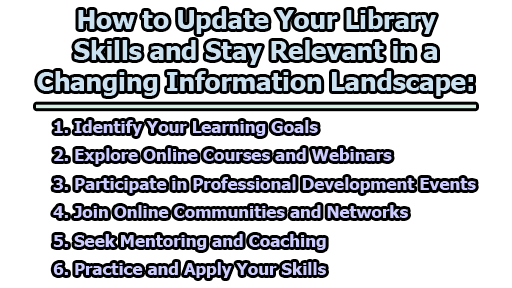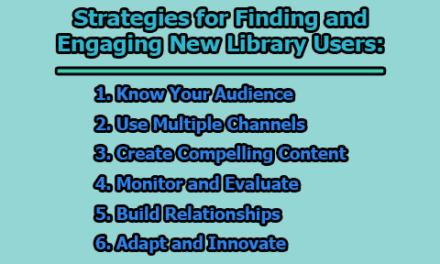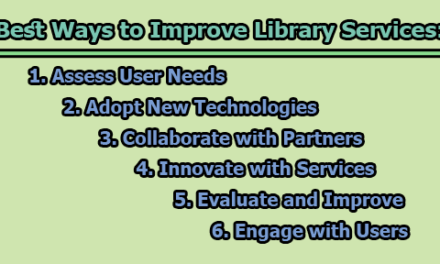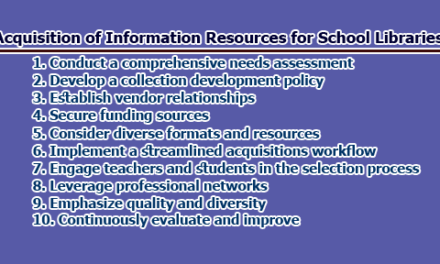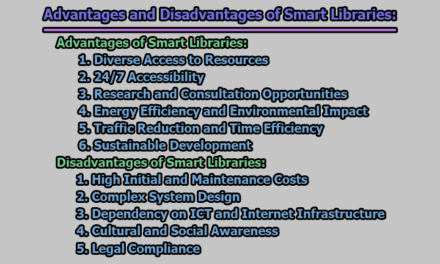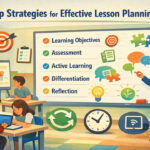How to Update Your Library Skills and Stay Relevant in a Changing Information Landscape:
Working in a library or aspiring to do so involves a continuous process of learning and adaptation. Library skills are not static; they evolve in response to changing needs, emerging technologies, and evolving trends in the information landscape. To stay relevant and effective in your current or future library role, it’s crucial to keep your skills up-to-date. In this article, we will explore how to update your library skills and stay relevant in a changing information landscape.
1. Identify Your Learning Goals: The first step in updating your library skills is to identify your learning goals. Consider what specific areas you need to refresh your knowledge or if there are new skills you want to acquire. Do you need to improve your expertise in cataloging, reference services, or collection development? Alternatively, are you looking to expand your skill set in areas like digital literacy, data management, or outreach? Moreover, do you have career aspirations that require demonstrating competencies such as leadership, project management, or teaching? By clearly defining your learning objectives, you can focus your efforts and measure your progress effectively.
2. Explore Online Courses and Webinars: Online courses and webinars are among the most convenient and affordable ways to update your library skills. Many reputable organizations and institutions offer free or low-cost options that cover a wide range of library-related topics. For example, you can find resources from the American Library Association, Library Juice Academy, WebJunction, Coursera, and many others. Additionally, you can check your local or regional library associations, networks, or consortia for further opportunities. These online resources allow you to learn at your own pace and adapt your learning to your schedule.
3. Participate in Professional Development Events: Engaging in professional development events is another effective way to enhance your library skills. These events, which include conferences, workshops, seminars, and symposia, provide you with opportunities to learn from experts, network with peers, and discover new ideas and innovations. The great advantage of these events is that you can choose to attend them in person or virtually, depending on your preferences and availability. Examples of such events include the ALA Annual Conference, the Library 2.0 Global Virtual Conference, and the ACRL e-Learning Webcast Series.
4. Join Online Communities and Networks: Becoming part of online communities and networks dedicated to library professionals can help you stay connected with colleagues who share similar interests, challenges, and goals. These platforms enable you to exchange information, advice, feedback, and support, keeping you updated on the latest developments in the field. You can find such communities on social media, blogs, podcasts, forums, and listservs. Examples include the Library Think Tank Facebook Group, the Librarian Problems Tumblr Blog, the LibUX Podcast, and the Librarianship Studies & Information Technology Forum.
5. Seek Mentoring and Coaching: Mentoring and coaching are invaluable resources for library professionals seeking to update their skills. A mentor or coach can provide guidance, challenges, inspiration, and support as you work towards your learning goals. You can find a mentor or coach within your organization, through professional associations, or online. Notable mentoring and coaching programs include the ALA Emerging Leaders Program, the ACRL Peer-2-Peer Mentorship Program, and the Library Leadership and Management Association Coaching Program.
6. Practice and Apply Your Skills: The most crucial step in updating your library skills is to practice and apply them in your daily work or projects. Seek opportunities within your current role to use your skills or volunteer for new tasks, assignments, or initiatives that require them. You can also create your projects, such as developing a portfolio, writing a blog, or starting a podcast. By applying your skills, you not only demonstrate your value but also enhance your performance and confidence.
In conclusion, library skills are dynamic and require constant updating to meet the evolving needs and expectations of users and the changing information landscape. By following the tips and utilizing the resources mentioned in this article, you can ensure that you stay relevant and effective in your library role. Embrace continuous learning and adaptation, and you’ll be well-prepared to meet the challenges and opportunities that come your way in the library profession.

Library Lecturer at Nurul Amin Degree College

